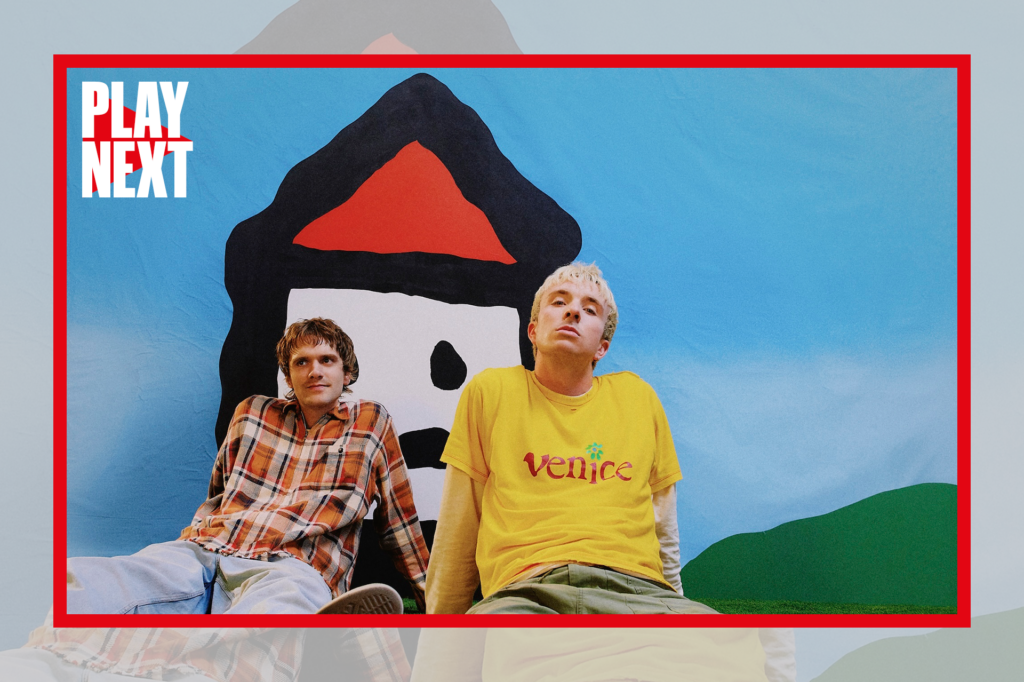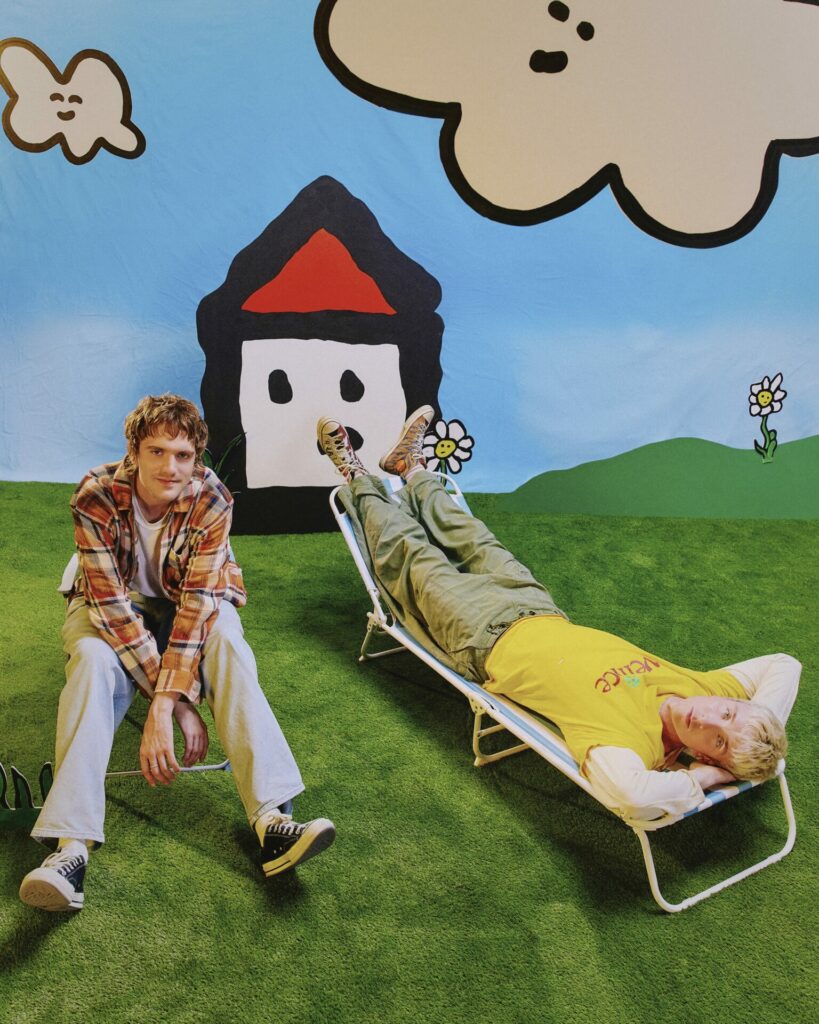Meet Good Neighbours, the viral duo bringing back tropical indie
Oli Fox and Scott Verrill talk the concept of guilty pleasures, and wanting to “feel like a teenager” when making music

When Good Neighbours’ Oli Fox and Scott Verrill met, they bonded over the dissatisfaction they were feeling in their respective musical endeavours. The pair shared a space in an east London studio, and were both producing and writing for others with little creative satisfaction for themselves.
“We had a lot of spare time, and were a bit burned out from writing a lot of pop stuff with people,” Verrill says, with Fox adding: “We were doing things that were against the rules of the pop that we were working on.”
Away from these stringent set of guidelines, the pair formed Good Neighbours and looked for inspiration away from current trends and towards the music they grew up loving.
Taking cues from the tropical indie sounds of 2010s staples like Foster the People, the band deliberately swerved sounds that were currently in vogue, and instead have ended up spearheading a return of these types of sounds themselves. Earlier this year, they struck gold with the single ‘Home’, which was teased on TikTok for months before its full version was released, currently sitting on more than 300million Spotify plays.
Of the ethos, Fox says: “Scott was doing singer-songwriter stuff and I was doing dance-leaning writing. All of that is so intricate and small, so when we got together, the most fun thing to do was to get a massive fucking synth, a massive reverbed vocal and have it all very brash and in your face. That became the DNA for every song that we would do.”
Watch the band’s video for ‘Home’ and read our Play Next interview with Good Neighbours below.
When you first came together to make music, what drew you in the direction of this bright, melodic indie sound?
Oli: It was just personal taste really.
Scott: We never really liked the pop stuff we were making that much, and no-one references the indie 2000s scene. We’d never delved into it together and realised we have all these mutual bands [that we like].
Oli: It was like a guilty pleasure making it.
Scott: We were desperate to make something fun, and that you felt like a teenager when you were making it.
Guilty pleasures are an interesting concept – it’s only guilty if you allow yourself to feel that it is. Pop-punk is massively in vogue again now thanks to Olivia Rodrigo…
Oli: It’s a bit of a risk, but when we started making it, the whole thing felt like fate. When we started to feel like this could be a band, all the deep cuts of Foster the People were started circulating again online. Kids were finding them for the first time. That was the universe screaming at us and saying, ‘You are the ones that need to bring it to the forefront and really do it’. That really motivated us.
Does your recent debut EP serve as a chronological run through the start of the band?
Oli: It’s kind of chronological. We went on a purple patch of ‘Keep It Up’, ‘Daisies’, ‘Ripple’. ‘Home’ was the last song we wrote for the EP. We had the chorus for ages and never really thought much of it to be honest. Then we put [the teaser] out and it popped off, so we realised we needed to finish it straight away. ‘Home’ was the keys going in the engine and wanting to shout our name as loudly as possible. When ‘Keep It Up’ came out, that’s when we could actually show what we’re about.

Does the music you’ve been writing since the EP follow a similar sonic path, or are you looking to experiment beyond that?
Scott: We’re trying to experiment a little bit more. We definitely had a formula with the earlier music, which I guess was easy to write. We’re trying to push ourselves a little bit more. It’s a little bit more electronic.
Oli: When you’re playing gigs, you start to see gaps in your discography. As performers, we know where we want the gig to go, but realise that we haven’t even written that song yet. It’s such a good practice of knowing BPMs that we’re missing out, or the feel of a song that we haven’t got yet.
People have been sending us loads of 2000s bands that we remind them of, and we’ve been listening to them and taking a lot of inspiration from that. It’s evolving in front of our eyes. We’re excited to show people.
Scott: We’re trying to keep the naivety that we had before, just making stuff on our laptops between the two of us and trying to keep it janky.
The lyrics of Good Neighbours are very personal – was it nice to be able to write from that place after years of writing for others?
Oli: The weirdest thing as a songwriter is having a message that you know you want to say, but you feel bad inflicting it onto another artist. Or there’s a real nugget that they could have, but they just can’t relate to it. That was a bit of a struggle for me as a writer, and I always wondered why that was. I guess this band pointed out that maybe I’d needed to just say it as the artist.
That’s been a real help for me, personally and mentally, to have a space to talk about struggle and then see it react on a big scale with people around the world. It’s been a real acceptance of stuff that I’ve been dealing with personally, which has been a really lovely part of the project. When people come up to you after the gig and tell you that you’ve helped them through a really hard time, you hear about that happening with other artists, but when it happens to you for the first time, you’re like, ‘Oh shit, I can actually make a difference, or lighten someone else’s load’.
Was that method of working especially true for ‘Home’?
Oli: We write really quickly, and I have a load of voice memos of ideas, but they rarely ever have lyrics. It’s more whatever’s in the room that day – whatever the energy is – we just address it there and then. ‘Home’ was a prime example of that. I’d been at a funeral the day before, and I’d hated it, I hated being home. When I got to London, I hugged my girlfriend at the time, and my whole body relaxed. I had this really visceral feeling before seeing Scott. I had this epiphany of realising that maybe home isn’t a place – it’s a person. [Scott] was just already going around the chords, and we just tapped into it there and then. I don’t think that anything was premeditated. A lot of our writing is very off the cuff – you just get to hear the good ones.
